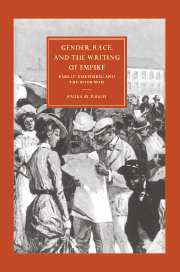Book contents
- Frontmatter
- Contents
- Acknowledgments
- 1 The war at home
- 2 The concentration camps controversy and the press
- 3 Gender ideology as military policy – the camps, continued
- 4 Cannibals or knights – sexual honor in the propaganda of Arthur Conan Doyle and W. T. Stead
- 5 Interpreting South Africa to Britain – Olive Schreiner, Boers, and Africans
- 6 The imperial imaginary – the press, empire, and the literary figure
- Notes
- Works cited
- Index
- CAMBRIDGE STUDIES IN NINETEENTH-CENTURY LITERATURE AND CULTURE
6 - The imperial imaginary – the press, empire, and the literary figure
Published online by Cambridge University Press: 22 September 2009
- Frontmatter
- Contents
- Acknowledgments
- 1 The war at home
- 2 The concentration camps controversy and the press
- 3 Gender ideology as military policy – the camps, continued
- 4 Cannibals or knights – sexual honor in the propaganda of Arthur Conan Doyle and W. T. Stead
- 5 Interpreting South Africa to Britain – Olive Schreiner, Boers, and Africans
- 6 The imperial imaginary – the press, empire, and the literary figure
- Notes
- Works cited
- Index
- CAMBRIDGE STUDIES IN NINETEENTH-CENTURY LITERATURE AND CULTURE
Summary
Although Olive Schreiner was the South African writer most famous in Britain, the novels of South Africa that England loved best were H. Rider Haggard's. Through Schreiner and Haggard, 1880s and 1890s Britons derived a sense of southern Africa, and two more different versions of the region would be difficult to imagine. Schreiner used essays, allegory, polemic, and fiction to try to paint a portrait of a South Africa that Britons would respect for its differences yet want as a somewhat autonomous member of the empire, perhaps equivalent to Canada. The Story of an African Farm, for all of its spirituality and experimentation, is at heart a Victorian realist novel, set in an Africa about which Britons were increasingly eager to learn. The novels of Rider Haggard, however, treated the reading public to a very different southern Africa. “King Romance” filled his southern Africa with adventure, passion, guns, and spears. But with the coming of the Boer War, Britons looked beyond these writers associated with southern Africa. For an imperial war, the services of the laureate of empire were needed. This chapter moves from the African expert Haggard to the imperial bard himself, Rudyard Kipling, and explores the effects of the British public's desire for a single, Kipling-shaped, sense of empire.
Both Olive Schreiner and Arthur Conan Doyle were able to contribute to public debate about the Boer War because of their positions as prominent literary figures.
- Type
- Chapter
- Information
- Gender, Race, and the Writing of EmpirePublic Discourse and the Boer War, pp. 143 - 178Publisher: Cambridge University PressPrint publication year: 1999



